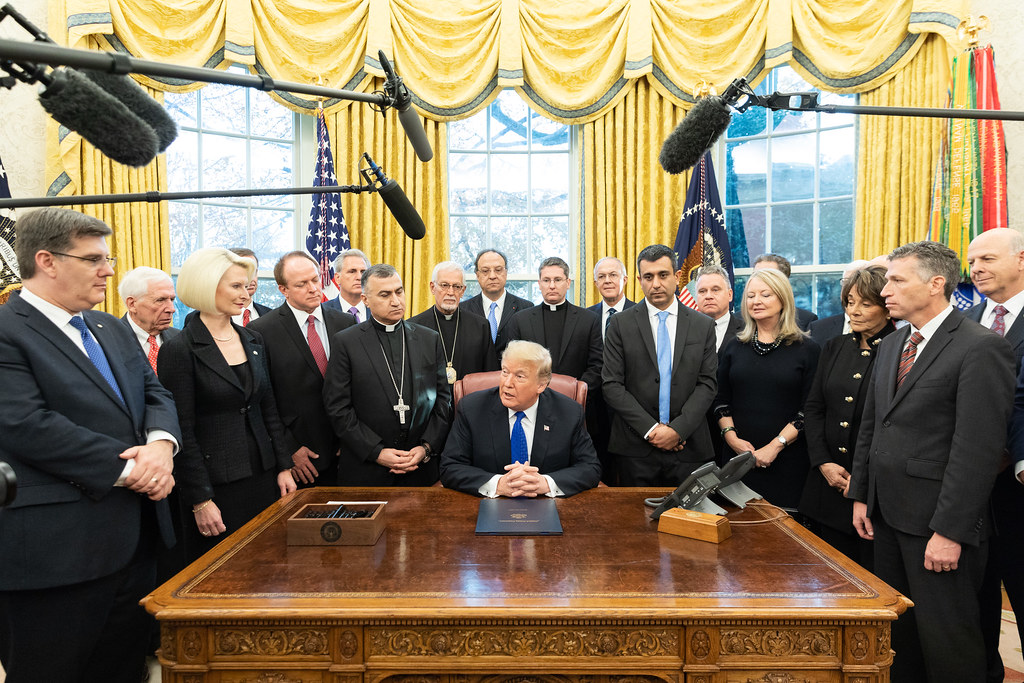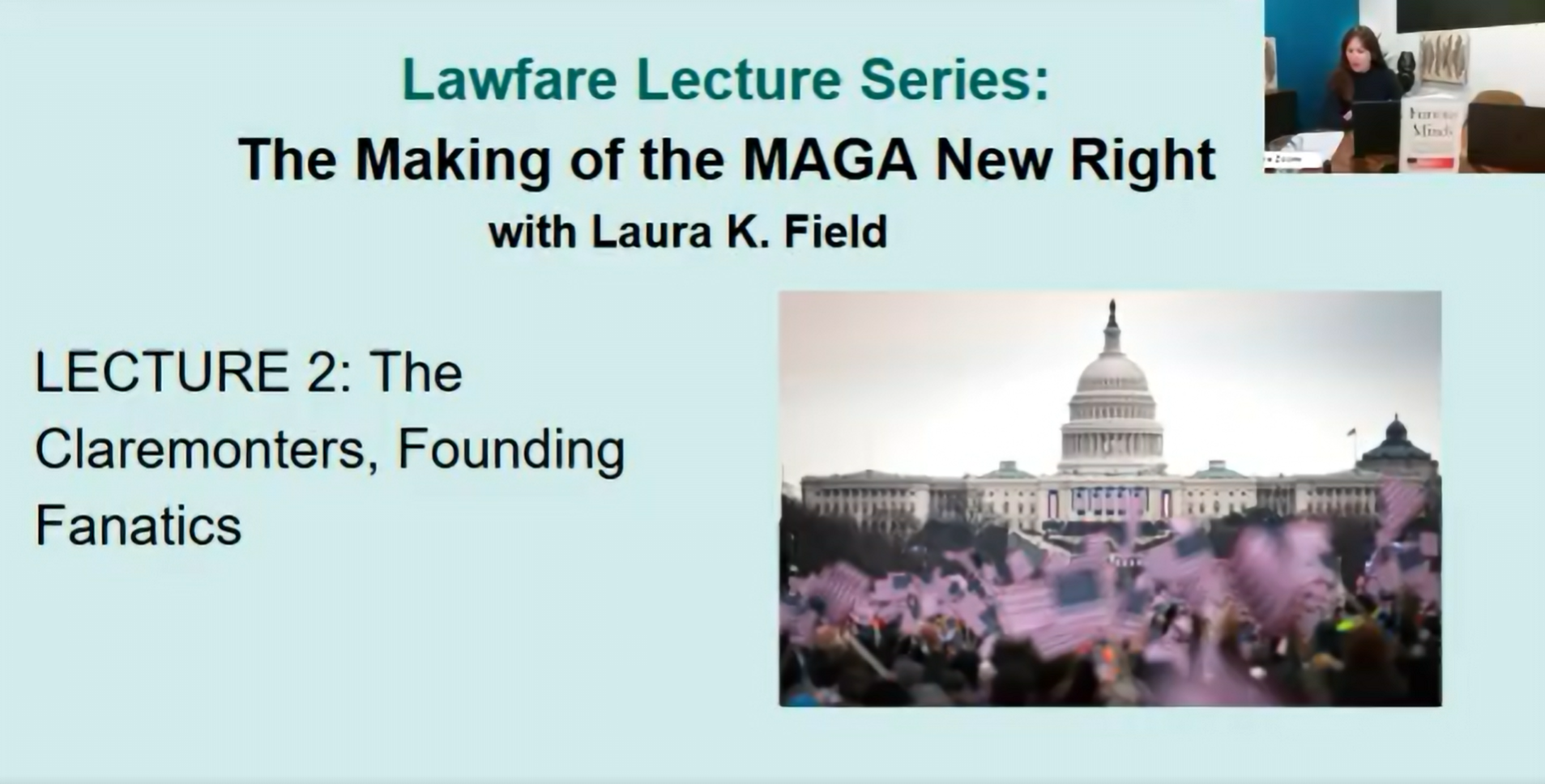The Recommendations Clause as a Tool of Executive Power

Published by The Lawfare Institute
in Cooperation With

Much has been written about the Trump administration’s broad understanding of the scope of executive power. This post delves into one important but underexplored way that this administration, building on the practice of previous ones, has shielded executive branch policy information from Congress—and thereby prevented Congress from effectively exercising its legislative and oversight powers.
It works like this:
Because the president has unique access to policy information as the one in charge of executing the law, particularly in areas under great executive control, such as foreign affairs and national security, Congress often passes laws requiring the administration to provide it with legislative recommendations on particular policy topics.
I call these “triggering laws” because they trigger a recommendation from the executive branch on a particular policy topic, without dictating the content of that recommendation. For example, the Iraq and Syria Genocide Relief and Accountability Act, which President Trump signed into law in December 2018, requires that the secretary of state submit to Congress a report assessing “the feasibility and advisability of prosecuting ISIS members for whom credible evidence exists of having committed genocide, crimes against humanity, or war crimes in Iraq” and including “recommendations for legislative remedies and administrative actions to facilitate the implementation of this Act.”
That Congress would benefit from the opinions of the executive in making new laws is not an exotic idea. In fact, it was specifically contemplated by the Framers. They included the Recommendations Clause in Article II, Section 3, which specifies that the president “shall ... recommend to [Congress’s] consideration such measures as he shall judge necessary and expedient.” Early drafts of the Constitution originally provided only that the president “may” recommend “matters” to Congress. By changing the language to make it the president’s constitutional duty to recommend formed legislative measures to Congress, the Framers demonstrated a clear intention that the president play a substantive role in congressional lawmaking.
In an interesting twist, however, presidents going back to Reagan have interpreted the positive duty to recommend measures to Congress to entail negative power to block Congress’s ability to seek recommendations through triggering laws like the Iraq and Syria Genocide Relief and Accountability Act. Indeed, on signing that bill into law, President Trump issued a statement declaring his administration’s intent to treat the section requiring the report to Congress as optional, based on its interpretation of the Recommendations Clause.
So, Congress passed and the president signed a law requiring the president to make policy recommendations to Congress. But the president refused to recognize that law, citing a clause in the Constitution that compels the president to make policy recommendations to Congress. What is going on here?
That is the question I set out to answer in a forthcoming piece in the University of Pennsylvania Law Review. I outline my findings and arguments in greater detail below, but the short version is: (a) Every president since Reagan has wielded the Recommendations Clause as a source of negative executive power to escape triggering laws, but the Trump administration does so much more frequently than the Obama administration did and is on pace to rival the George W. Bush administration’s record for doing so; (b) presidents also use this reading of the Recommendations Clause to pressure lawmakers to change legislation while it is pending in Congress; and (c) the prevailing interpretation of the Recommendations Clause advanced by these administrations to justify this conduct perverts the clause’s purpose and gives the president a level of control over executive branch information that could undermine Congress’s ability to effectively carry out its legislative and oversight functions.
Reinterpreting Triggering Laws Through Signing Statements
It has become common for presidents to state constitutional objections to certain provisions of new laws in signing statements, and the Recommendations Clause is the basis of a substantial portion of these constitutional objections—despite a lack of academic and media attention to it. The vast majority of these Recommendations Clause objections are made in response to triggering laws. (Some objections are made in response to “muzzling laws”—laws that prohibit the administration from using funds to explore particular policy areas. These rest on firmer constitutional ground, as muzzling laws more straightforwardly impair the president’s ability to carry out the duty to recommend measures to Congress.)
My analysis reveals substantial variations in the frequency with which different presidents have used signing statements as a tool to exercise negative power under the Recommendations Clause: President George W. Bush was the most frequent culprit, having issued 60 signing statements objecting to triggering laws on Recommendations Clause grounds. President Obama substantially reigned in the use of signing statements to reinterpret triggering laws, issuing just two. But President Trump has reexpanded the practice and is on track to rival Bush, having issued 16 such signing statements as of August.

These signing statements typically state the administration’s objection to the triggering law and announce its intention to “treat this provision consistent with” its capacious reading of executive discretion under the Recommendations Clause. These are not empty words; at least sometimes they signal the true intent of the administration to withhold the required information from Congress.
For example, the Medicare Prescription Drug, Improvement, and Modernization Act, signed into law in 2003, contained a provision requiring that the president recommend responsive legislation to Congress in the event of a “Medicare funding warning” (which occurs when the portion of Medicare expenditures paid for with general revenues—as opposed to dedicated Medicare funding—surpasses 45 percent two years in a row). Bush issued a signing statement containing a Recommendations Clause objection to this triggering provision. While he ended up submitting the required legislation to Congress anyway after a Medicare funding warning during his tenure, Obama and Trump did not comply with the requirement after Medicare funding warnings during their terms. Echoing the Bush signing statement, they both declared in their budgets that, based on their reading of the Recommendations Clause, they would treat the law as merely “advisory” and neither submitted responsive legislation within the prescribed 15-day period. Two presidents relied on Recommendations Clause to escape a statutory requirement to submit to Congress a policy recommendation, so Congress did not receive the benefit of the executive branch’s unique perspective.
Influencing Legislation Through Department of Justice Views Letters
Signing statement objections are often foreshadowed in more detail in the form of a Department of Justice views letter sent to Congress while the legislation was pending. (Jean Galbraith and I discussed the Trump Administration’s use of these letters here on Lawfare.) Administrations often send these letters, drafted by attorneys in the Department of Justice Office of Legal Counsel (OLC) and usually with the signature of the assistant attorney general for legislative affairs, to relevant members of Congress expressing both the administration’s policy and legal opinions about pending legislation.
There is evidence that Justice Department views letters stating Recommendations Clause objections to certain provisions of pending bills can influence the content of those bills. For example, consider the Obama administration’s Justice Department views letter to Congress regarding the Intelligence Authorization Act for Fiscal Year 2010. That bill included a triggering provision requiring the president to submit to Congress an “assessment of the need for any modification ... for the purpose of improving legal protections for covert agents.” The views letter expressed concern that this language could be “construed to require the President to submit legislative recommendations for congressional action even where he did not think any legislation is advisable” in violation of the Recommendations Clause. It advocated a change in the language to only “require recommendations of statutory measures deemed appropriate, if any” (emphasis added).
The version of the bill that passed into law contained the “if any” language. The administration successfully asserted its interpretation of the Recommendations Clause to change legislation pending in Congress.
Less data is available on Justice Department views letters, but what is available suggests that, as with signing statements, while the Obama administration infrequently used this tool to enforce its reading of the Recommendations Clause, the Trump administration has been more aggressive. Of the views letters available on the Justice website, the Obama administration sent three stating a Recommendations Clause objection through its two terms, while the Trump administration had already sent 10 as of August of this year.
The Real Meaning of the Recommendations Clause
In 2016, OLC issued an opinion justifying the Obama administration’s noncompliance with the Medicare funding warning law from the above example. That opinion represents the most comprehensive defense of the prevailing executive branch interpretation of the Recommendations Clause to date. It contends that, because the Recommendations Clause requires the president to recommend only “such measures as he shall judge necessary and expedient,” when Congress passes triggering laws that require the president to make a recommendation on a particular policy topic, it violates the president’s discretion to decide what is necessary and expedient.
That argument is fatally flawed.
First, it is ahistorical. As discussed above, the Framers considered, and rejected, making it optional for the president to make policy recommendations to Congress. The Framers consciously made providing legislative recommendations to Congress a presidential duty of constitutional dimension; it is implausible that in the same breath they meant to provide the president a tool to avoid doing just that.
Second, OLC’s interpretation also lacks the support of long-standing historical practice. OLC first advanced the argument that the Recommendations Clause permits the president to ignore statutory requirements to send policy recommendations to Congress in 1981. But even a superficial search reveals that Congress passed numerous triggering laws as far back as the early 1940s without any objection from the administration on Recommendations Clause grounds.
Third, the administration’s interpretation runs afoul of separation of powers principles. Under the framework outlined in Justice Jackson’s canonical concurrence in Youngstown Sheet & Tube Co. v. Sawyer, presidents operate at the “lowest ebb” of their authority when they act contrary to the expressed will of Congress—like when the president refuses to follow a duly passed triggering law. The Supreme Court later held in Nixon v. Administrator of General Services that Congress impermissibly trespasses on executive power only when it passes a law that “prevents the Executive Branch from accomplishing its constitutionally assigned functions.”
But nothing about Congress requiring a legislative recommendation from the executive branch impedes the president from performing any constitutionally assigned function. Recall again the example of the Medicare funding warning law: There is nothing about Congress requiring the president to recommend legislation to respond to a Medicare funding warning that prevents presidents from fulfilling their duty under the Recommendations Clause to recommend measures to Congress. Indeed, the two are aligned.
Moreover, unlike other executive functions, there is no reason to think the power to make legislative recommendations to Congress should be exclusive to the president. Even the OLC opinion concedes that “the ability to make recommendations to Congress—unlike the authority to nominate officers, receive ambassadors, or enforce the laws—is widely shared with other persons.” OLC dismisses the distinction, but it actually carries an important difference: Unlike making appointments, conducting diplomacy or prosecuting breaches of the law, others can make legislative recommendations to Congress without frustrating the president’s ability to do the same.
And a recommendation’s effect depends wholly on the reaction of Congress. When the president appoints someone, the appointee assumes a position together with its duties and powers; when the president receives an ambassador, a diplomatic interchange occurs; when the Department of Justice initiates a prosecution, a particular set of procedures follows. By contrast, when a recommendation is sent to Congress, nothing else necessarily happens. Triggering laws simply do not implicate the president’s ability to perform the office’s constitutionally assigned functions
The better reading of the Recommendations Clause identifies the “necessary and expedient” modifier not as a grant of exclusive discretion to the president over when to make recommendations but, rather, as a limitation on the president’s positive duty to recommend. That is, the Framers did not draft the Recommendations Clause to require presidents to recommend measures they “shall judge necessary and expedient” in an attempt to ensure that Congress could not require a recommendation using its legislative powers. That would be contrary to the clause’s purpose of ensuring presidential participation in congressional lawmaking. Rather, they did so to permit presidents to define the limits of their independent duty to make recommendations, as a limitless duty to continually recommend any and all measures to Congress simply would not be administrable.
The Path Ahead
The prevailing executive branch reading of the Recommendations Clause, and President Trump’s aggressive use of that reading to reinterpret duly passed triggering laws and amend pending legislation, strips Congress of the ability to acquire important policy input from the executive branch. The next president could mitigate this problem by reinterpreting the Recommendations Clause consistent with its purpose and separation of powers principles and by faithfully executing triggering laws. Until then, Congress could seek redress in the courts and prevent the bottleneck of executive branch information through smart use of its own legislative and oversight powers.



.png?sfvrsn=bd249d6d_5)

